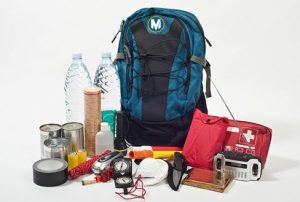Disaster Preparation- Now is the time!
 Having the proper provisions can help make a difficult scenario safer. When creating an emergency survival kit, consider supplies to last you and your family for a minimum of three to seven days.
Having the proper provisions can help make a difficult scenario safer. When creating an emergency survival kit, consider supplies to last you and your family for a minimum of three to seven days.
In case of emergencies that may require that you leave your home quickly, such as a fire, prepare a “to-go” bag well in advance, and keep it in an easily accessible location so you can take essential items with you if you must evacuate with little notice.
Take the time to prepare for the unpredictable:
- Enough water for a gallon of water per person, per day. Consider LifeStraws and water treatment kits as well.
- Map out an evacuation route
- Flashlights with extra batteries
- First-aid kit and prescriptions
- Sleeping bags or blankets
- Camping stove
- Chargers and car chargers
- Duct tape
- Food
- Peanut Butter
- Dry and canned soups
- Instant rice and oatmeal
- Beans
- Canned and/or freeze dried fruits and vegetables. Also kid’s veggie/fruit pouches don’t need to be refrigerated.
- Breakfast bars
- Powdered eggs and milk
- Freeze dried meals- some have a 25-year shelf life!
Emergency Kit Storage
An emergency kit at home won’t do you much good while you’re at work, and your work kit probably can’t help if you’re stranded in your car. In order to keep yourself covered, make sure you have access to emergency supplies no matter where you are.
- Home
To stay protected, it’s important to ensure kits are always within reach, like in a first-floor closet. Don’t hide essentials in the attic or down in the basement; these areas may not be in reach if disaster strikes. If possible, keep an abbreviated version of your kit on each level of your home to be sure amenities are always seconds away. - Car
There likely isn’t room for a full emergency kit in your car. But keeping some of the basics on hand, either in the trunk or the backseat, can provide peace of mind. Focus on a small supply of food and water, a first aid kit, tools that can help with car repair, road flares, and insurance information. You also might want to check if your auto insurance provides emergency roadside assistance. - Office
Accidents can happen anywhere. Disaster might leave you stranded without resources in the office. Keep a small kit at your desk with water bottles, non-perishable snacks, a first aid kit, money, batteries, flashlight, gloves, and emergency blanket. Consider any other items that may be specific to your place of business.
In the event of severe damage to your home or business, having a current inventory of possessions – including make and model numbers- can help get your insurance claims settled faster, verify losses, and help you purchase the correct amount of insurance.
Call us today to discuss!
Source
social.selective.com